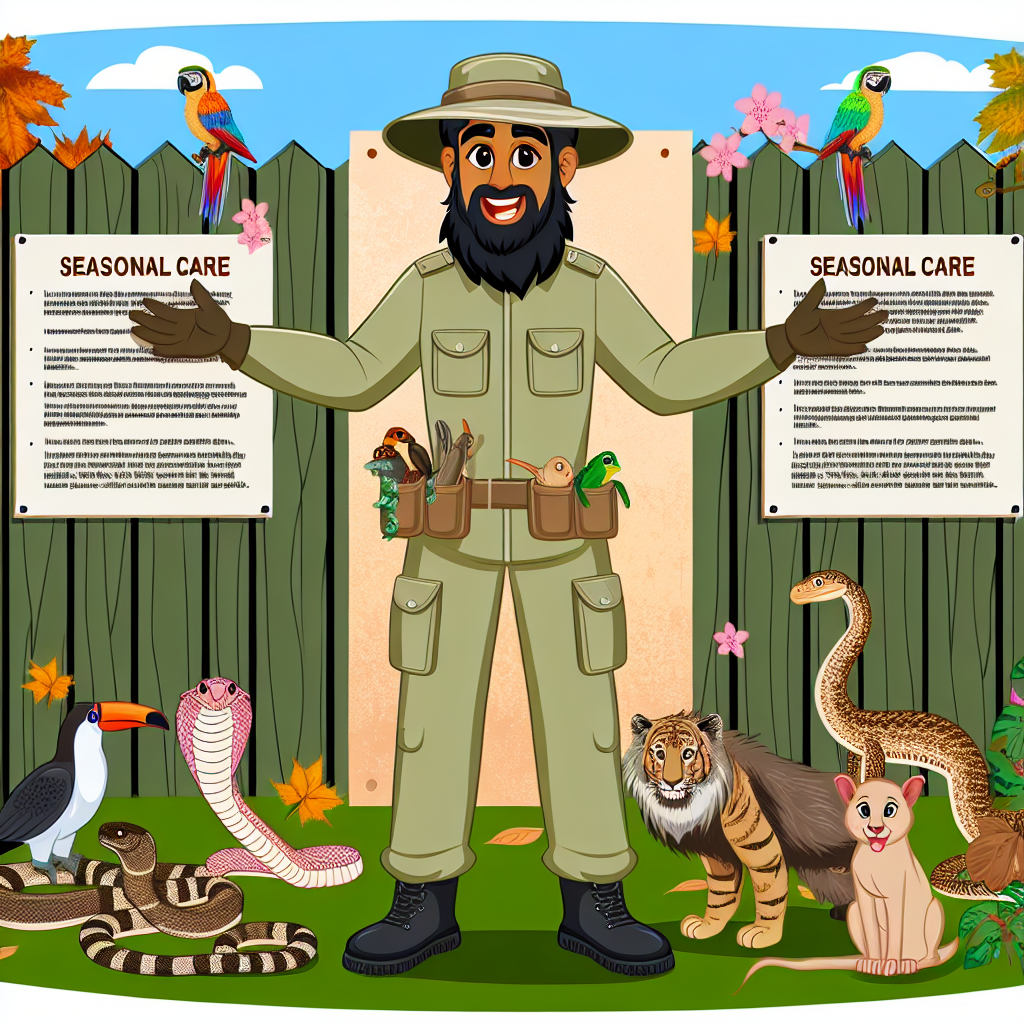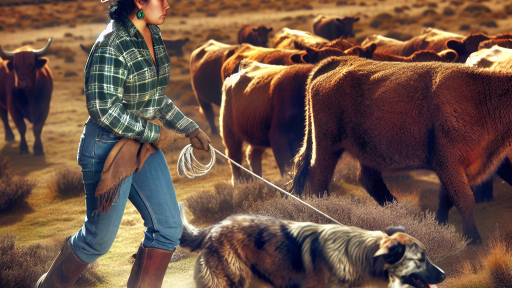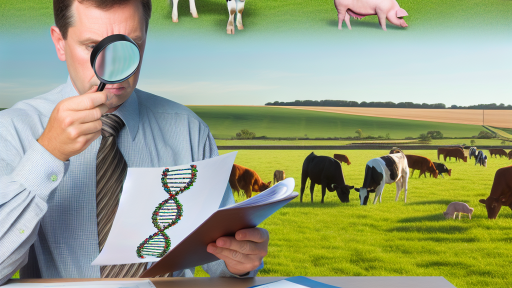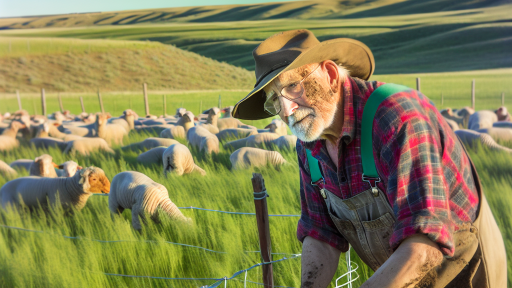Understanding the Unique Needs of Exotic Animals by Season
Spring Care Tips
As temperatures rise in spring, many exotic animals become more active.
Ensure their habitats have proper ventilation to prevent overheating.
Introduce fresh, seasonal foods to their diet for nutritional balance.
Regularly check the water supply, as animals need hydration during this active time.
Observe any behavioral changes that may indicate health issues.
Summer Care Tips
During the summer months, monitor the temperature closely.
Provide shaded areas in their outdoor enclosures to help them cool down.
Consider adjusting their feeding schedule to avoid the hottest times of day.
Ensure higher humidity levels are maintained for tropical species.
Regular baths can help with heat regulation and skin health.
Fall Care Tips
As temperatures begin to drop, prepare your exotic animals for colder weather.
Gradually transition them to a diet more suitable for the cooler months.
Inspect their enclosures to ensure they are insulated against the chill.
Provide extra bedding materials for warmth and comfort.
Monitor their health closely, as the change in weather can affect them significantly.
Transform Your Agribusiness
Unlock your farm's potential with expert advice tailored to your needs. Get actionable steps that drive real results.
Get StartedWinter Care Tips
During winter, maintain a stable and warm environment for your exotic animals.
Use heat lamps or specific heating devices designed for their species.
Limit outdoor exposure to prevent frostbite and other cold-related issues.
Increase the frequency of health checks to ensure they are thriving in the winter.
Provide enrichment activities indoors to keep them stimulated despite the colder weather.
Preparing Habitat Conditions for Different Climatic Changes
Understanding the Needs of Exotic Animals
Exotic animals have specific habitat requirements based on their species.
Different climates can significantly impact their health and behavior.
Therefore, understanding these needs is crucial for their well-being.
Adjusting Temperature and Humidity
Temperature control is vital for the comfort of exotic animals.
Use heating lamps or under-tank heaters for reptiles.
For tropical species, maintain higher humidity levels.
Regularly monitor and adjust these conditions as needed.
Moreover, ensure that there are cooler areas for species that cannot tolerate heat.
Creating Appropriate Enclosures
Your animal’s enclosure should mimic its natural habitat.
Include vegetation, hiding spots, and proper substrates.
For instance, desert species prefer sandy surfaces.
On the other hand, rainforest creatures thrive with rich soil and plants.
Above all, regularly clean and maintain the enclosure.
Seasonal Diet Adjustments
Seasonal changes can also necessitate dietary adjustments.
Some animals may require fresh fruits and vegetables during warmer months.
Provide dried or preserved foods during colder seasons.
Research your animal’s dietary needs throughout the year.
Always ensure fresh water is available, regardless of the season.
Monitoring Behavior and Health
Always observe your exotic animals for signs of stress.
Showcase Your Farming Business
Publish your professional farming services profile on our blog for a one-time fee of $200 and reach a dedicated audience of farmers and agribusiness owners.
Publish Your ProfileChanges in behavior can indicate discomfort with habitat conditions.
Keep an eye out for changes in appetite or activity levels.
When necessary, consult with a veterinarian specializing in exotic species.
Regular check-ups can help catch potential health issues early.
Dietary Adjustments for Exotic Animals in Seasonal Transitions
Understanding Seasonal Needs
Exotic animals require dietary adaptations during seasonal changes.
Different seasons bring shifts in natural food availability.
These changes can impact the health and well-being of exotic pets.
For instance, winter may reduce the supply of fresh greens.
In contrast, summer often increases access to various fruits and insects.
Identifying Nutritional Requirements
Each species has unique nutritional needs that must be met year-round.
Some exotic animals need more protein during colder months.
Conversely, others may require higher fiber intake in warmer climates.
Consider consulting with a veterinarian for personalized advice.
Adapting Food Sources
Foraging behaviors often change with the seasons.
Encourage natural behaviors by providing seasonal food variety.
- Introduce fresh fruits during summer months.
- Offer more protein-rich foods in colder seasons.
- Ensure access to fresh greens year-round.
Monitoring Weight and Health
Regularly monitor your exotic animal’s weight and health.
Adjust dietary portions based on their seasonal activity levels.
Track changes in appetite and energy to assess nutritional adequacy.
Maintain records to help identify patterns in diet-related issues.
Hydration is Key
Ensure access to clean, fresh water throughout the year.
During hotter months, hydration needs may increase.
Consider adding water-rich fruits to their diet in summer.
In colder months, monitor water intake to prevent dehydration.
Gain More Insights: Cost-Effective Exotic Livestock Management
Seasonal Health Checks
Importance of Regular Health Checks
Regular health checks are crucial for exotic animals.
These checks help identify potential health issues early.
Additionally, they provide an opportunity for vaccinations.
Moreover, they ensure your pet is thriving in its environment.
Common Seasonal Issues
Exotic animals face specific health challenges with each season.
For instance, humidity changes can impact reptiles’ skin.
In winter, temperature drops may stress tropical species.
Therefore, awareness of these issues is vital for care.
- Skin problems in reptiles due to low humidity.
- Respiratory issues in birds during cold months.
- Digestive troubles in herbivorous animals during summer.
Recognizing Health Issues
Monitoring behavior helps in recognizing health issues early.
Changes in appetite can indicate problems.
Additionally, unusual lethargy is often a red flag.
Watch for abnormal droppings, which may signal digestive issues.
Veterinary Care Recommendations
Consult a veterinarian who specializes in exotic animals.
Seek immediate care if you notice concerning symptoms.
Routine vaccinations are essential for disease prevention.
Furthermore, regular check-ups build a good relationship with your vet.
Showcase Your Farming Business
Publish your professional farming services profile on our blog for a one-time fee of $200 and reach a dedicated audience of farmers and agribusiness owners.
Publish Your ProfilePreparing for Seasonal Changes
Prepare your exotic pet for seasonal changes effectively.
Ensure their habitat conditions match their needs.
For example, adjust humidity and temperature as needed.
Provide proper diet adjustments according to seasonal availability.
Discover More: Managing Goat Behavior on the Farm
Behavioral Changes in Exotic Animals During Different Seasons
Seasonal Temperatures
Exotic animals often react to temperature changes in their environment.
For instance, reptiles require specific heat levels to maintain their metabolism.
Conversely, during colder months, they may become less active.
Higher temperatures usually lead to increased activity and feeding behavior.
Light and Day Length
Changes in daylight can significantly influence animal behavior.
Longer days during spring and summer encourage breeding activities.
On the other hand, shorter days often signal a time for rest or hibernation.
Animals may also change their feeding patterns based on light availability.
Humidity Levels
Humidity impacts the well-being of various exotic species.
Many tropical species thrive in high humidity conditions.
When humidity drops, they may exhibit signs of stress or dehydration.
Adjusting their habitats to maintain proper humidity is crucial for their health.
Behavioral Adaptations
Animals adapt their behaviors to cope with seasonal changes.
For example, some birds migrate to warmer regions during winter.
Others may increase their foraging activities in preparation for colder months.
Understanding these adaptations helps ensure proper care for exotic pets.
Impact of Seasonal Diet Changes
Seasonal changes can alter the availability of food sources.
This impacts the diet of many exotic animals in their natural habitats.
Captive exotic animals may need diet adjustments to reflect these changes.
Providing variety is essential to meet their nutritional needs throughout the year.
Delve into the Subject: Eco-Friendly Practices for Exotic Farming

Best Practices for Seasonal Breeding and Mate Selection
Understanding Seasonal Breeding
Seasonal breeding affects many exotic species profoundly.
During breeding seasons, animals exhibit distinct behaviors.
Understanding these behaviors is crucial for successful breeding.
Researching Mate Selection
Choosing the right mate is vital for genetic diversity.
Researching lineage and health ensures better offspring quality.
Utilize genetic testing to identify compatible mates.
Thus, researching potential mates requires thorough documentation.
Evaluating Behavioral Traits
Behavioral traits significantly influence mating success.
Observing animal interactions helps gauge compatibility.
Look for signs of interest like courtship displays.
Additionally, pay attention to social hierarchies within species.
Creating Optimal Conditions
Providing the right environment fosters successful mating.
Temperature, humidity, and light cycles should mimic natural conditions.
Make sure to maintain a stress-free atmosphere.
Showcase Your Farming Business
Publish your professional farming services profile on our blog for a one-time fee of $200 and reach a dedicated audience of farmers and agribusiness owners.
Publish Your ProfileIsolation or group settings can impact mating behavior significantly.
Monitoring Health and Nutrition
A healthy diet promotes reproductive success in exotic animals.
Ensure that animals receive all necessary nutrients and vitamins.
Regular veterinary check-ups help monitor reproductive health.
Thus, strong nutritional support enhances breeding outcomes.
Timing of Breeding Activities
Recognizing the appropriate timing is essential for breeding.
Monitor hormonal cycles to predict optimal mating windows.
Use records from previous seasons for guidance.
Consequently, accurate timing can increase successful pairings.
Implementing Breeding Programs
Structured breeding programs help manage populations effectively.
Collaborate with wildlife organizations for best practices.
Set clear goals for breeding outcomes, such as genetic diversity.
Moreover, updated records ensure informed breeding decisions.
You Might Also Like: Choosing the Right Equipment for Your Aquaculture Setup
Climate-Specific Enrichment Activities to Encourage Natural Behaviors
Understanding the Importance of Enrichment
Enrichment activities enhance the quality of life for exotic animals.
They stimulate mental and physical health, promoting natural behaviors.
Thus, understanding the climate-specific needs is essential for effective enrichment.
Temperature-Controlled Enrichment Strategies
For hot climates, offer shaded areas for rest and cooling.
Provide water features like shallow pools to encourage playfulness.
In cooler climates, use indoor spaces with appropriate heating for comfort.
Outdoor enrichment can include snow or ice-based activities for certain species.
Seasonal Activity Suggestions
In spring, introduce foraging opportunities with flowers and green plants.
During summer, create misting stations to keep animals cool and engaged.
Fall activities can involve hiding treats in fallen leaves, stimulating natural instincts.
Winter offers unique chances to hide food within snow for exploration.
Species-Specific Considerations
Different species require tailored enrichment based on their natural habitats.
Tropical animals, like parrots, thrive with climbing structures and bright toys.
Desert dwellers, such as reptiles, benefit from sunbathing spots and sandy areas.
Rainforest animals, including tree frogs, enjoy water elements and vertical spaces.
Engaging Caregivers in the Process
Involve caregivers in designing enrichment activities.
Training sessions can enhance the bond between animals and caregivers.
Regular assessments ensure enrichment remains effective and engaging.
Feedback from animal behavior observations leads to continuous improvements.
Monitoring Behavioral Changes
Carefully observe changes in behavior following enrichment activities.
Documenting positive changes helps in future enrichment planning.
Adjust activities based on the unique preferences of each individual.
Regular evaluations promote long-term animal well-being and satisfaction.
Emergency Preparedness for Exotic Animals During Seasonal Storms
Creating an Emergency Plan
Every exotic animal owner must create a comprehensive emergency plan.
This plan should address potential seasonal storms.
First, assess your home’s vulnerabilities to severe weather.
Showcase Your Farming Business
Publish your professional farming services profile on our blog for a one-time fee of $200 and reach a dedicated audience of farmers and agribusiness owners.
Publish Your ProfileNext, identify safe areas for your exotic pets during storms.
Additionally, practice evacuation routes and protocols regularly.
Ensure that family members understand their roles in emergencies.
Gathering Essential Supplies
Stock up on necessary supplies well before storm season begins.
Your emergency kit should include food and water for your animals.
Include any medications your exotic pets may require.
Organize a first aid kit tailored for their specific needs.
Do not forget essential documentation, such as health records.
Preparing Your Home
Take proactive measures to prepare your home for storms.
Secure all windows and doors to reduce wind damage.
Consider using storm shutters for additional protection.
Set up a safe indoor space for your exotic pets.
This area should be away from windows and preferably in a basement.
During the Storm
Stay calm and monitor weather updates continuously.
Keep your exotic animals calm by providing comfort and reassurance.
Maintain their routines when possible to reduce anxiety.
Ensure they have access to fresh water at all times.
Check on them frequently throughout the storm.
Post-Storm Recovery
Assess damage in your home after the storm passes.
Check on your exotic animals promptly after the storm.
Provide any necessary veterinary care if needed.
Gradually reintroduce them to their usual environment.
Monitor their behavior for signs of stress or distress.
Finally, review and adjust your emergency plan as necessary.
Additional Resources
Cold weather animal safety | American Veterinary Medical Association




